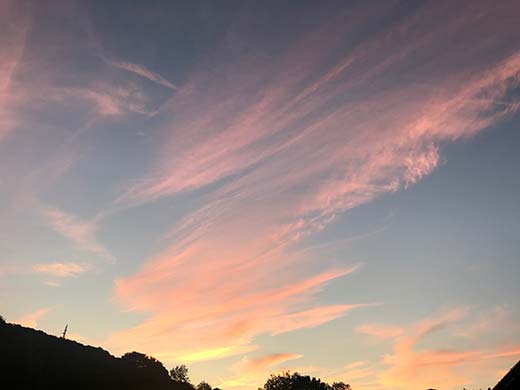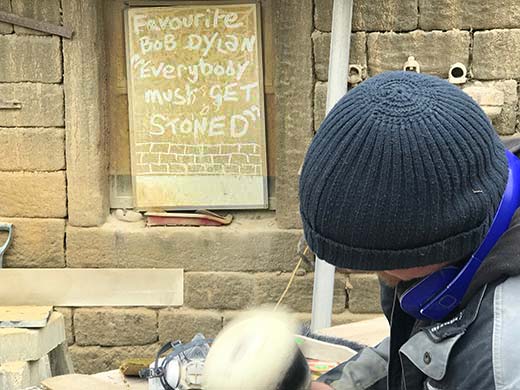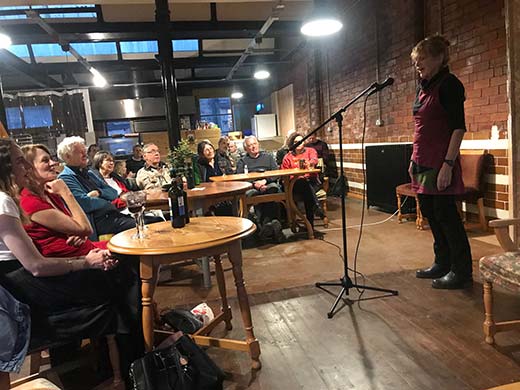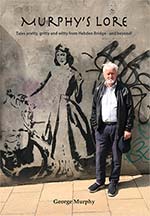
Third series, episode 15
All 107 episodes are available here on the HebWeb.
In the latest episode there's a good mourning, sunsets captured and a sun shooter, a folklore home in Tod, takes on a sad tale from Cornholme, Angela Carter's Hebden, observations on obscurity, the skill of finding things, hot topics for the elderly and after the Parade snaps.
Sunset over Hebden Bridge

Good mourning
It felt like a breach in the natural order. I was two years old when the Queen came to the throne. When I reached junior school, my parents bought me Arthur Mee's Children's Encyclopaedia, on the never never, from a door to door salesman - it must have cost them a fortune - and in one of its volumes was a colour plate of the Queen in her gold Coronation coach, like a scene from a fairytale.
After Elizabeth's death, politicians, statesmen and celebrities eulogised about her, provoking A.N. Wilson to write that so much sycophancy brought out his inner Cromwell. In contrast, Sarah Vine speculated that the appearance of a double rainbow over London had been, "Her Majesty's final message of hope, perhaps Prince Philip was up there too, once again by her side."
Bored with no news news, I took to looking out of the window at a succession of dazzling sunsets, without supposing that the ascended monarch had winged them up to Hebden as a farewell gesture.
Republican friends thought the drone's eye view of the public queueing along the hairpin bending course to Westminster Hall was best considered as a modern art Happening. Similarly, on Monday afternoon, Funeral Day, I finally caught up with proceedings and was beguiled by the Queen's last journey in the solemn procession to Windsor Castle.
The spell was cast by the hypnotic slow march's crunching, synchronised, 75 steps to the minute advance, the tolling of the tenor bell at 96 second intervals and the exactitude of the pall bearers (a hit on social media, and PW was a fan) and HM's Grenadiers, especially their rhythmical rocking, like winding down tin soldiers, as the hearse passed through pinch point Windsor gates and arches before these briefly famous busby babes returned to their syncronised progression.
Mid autumn
Just before Neil Young shed his long-time wife and took up with Carrie Snodgrass (or was it Daryl Hannah?) he composed Harvest Moon, a song which PW loves. Bountiful mid autumn soon tips into winter, but there's lots of ancient tales and customs from around the world that respond to the life giving harvest before darkness sets in …
The sun shooter and the moon
Ten suns used to beat down on our Earth. And how loudly people complained about the heat! But then sharpshooting god Hou Yi shot down nine of those suns.
As a reward, the Queen of Heaven presented Hou Yi with the Elixir of Immortality. He took it home to his partner Chang E for safekeeping.
Unfortunately, a burglar heard of the immortality elixir and sneaked into the house whilst Hou Yi was out hunting. Desperate to prevent the elixir from ending up in the wrong hands, Chang E drank it and immediately flew up to the heavens.
But Chang E really did not want to leave her lover. She tried to stay as close to Earth as she could. And so she ended up on the moon.
Hou Yi, who was left behind, mourned his beloved Chang E and wished to be with her again. On the day of the next full moon, he laid a feast of his wife's favourite foods in hope that she would one day return home.
And that's why on days with the full moon during the Mid-Autumn Festival, dishes of food are laid out in return for blessings from Chang E.
Stone me
A few days after my HebWeb Interview with stonemason Richard Whitaker, a teenage couple were walking past me in the stoneyard when the lass said, "I can never understand why there's always all these piles of stone lying about down here."

Centre for folklore

One Saturday evening, I made my first visit to Todmorden's National Centre for Folklore, Myth and Magic to hear Old Town storyteller Ingrid Burney's Shape Shifting Tales. She held the audience in her thrall, and included in her set a love story take on a sad local tale. After the gig, John Billingsley, followed me outside for a natter as I was leaving. I told him I enjoyed Ingrid's Cornholme story, but agreed with him that the story passed down to us has its roots in mysogyny. My head still charmed by Ingrid's telling, I added, "Yes, but when we adapt the story we musn't lose its magic."
So here's my updating of the tale, but without the love story
The white doe of Eagle Crag
Lady Sybil was a beautiful heiress who lived at Bernshaw Tower, close by Eagle Crag. People said that her radiance lit up that dismal vale. She charmed the cottagers, asking them about the potions and nourishments they gleaned from the tenacious flora that clung to the valley's thin soils. Certainly they talked about her of an evening and her ladyship magicked herself into their minds and their folklore: Lady Sybil longed for supernatural powers; Lady Sybil bartered her soul for the gift of witchcraft; Lady Sybil could take on any animal form she chose.
Sir William Towneley of nearby Hapton Tower was an ardent admirer of her ladyship, but she continually rejected his advances. So he paid Mother Helston, who also had the gift of witchcraft, for her advice. She made a fire of sticks, as the love sick William waited. Then she put more sticks on the fire and stared hard at its yellow flames, only pausing to cough, till his lordship got the message and tumbled more coins onto the witch's table. Then she said, "When you're next out hunting in Cliviger gorge look for a white doe."
Next morning he set off on his quest, alone apart from Mother Helston, who had changed herself into a hound. They cornered the white doe below Eagle Crag and he fastened a silken leash to its neck and led it back to Hapton Tower. Once there the doe turned back into Lady Sybil, beautiful, naked and tremulous. Martha the maid was sent to Bernshaw Tower to get clothes from her ladyship's housekeeper.
Meanwhile Lady Sybil had draped the window curtain around herself and promised Sir William she would henceforth renounce her witch's craft and marry him. He rewarded her for their betrothal with a signet ring. She stayed that day, clad in her own rich garments once more, but as the evening wore on, his lordship fell noisily asleep after an extended bout of feasting and drinking.
Lady Sybil had not finished her meal, nor drunk more than a few sips of ale. When Sir William fell into a drunken sleep, she took on the form of a white cat and went out hunting with other transformed witches. She was attacked by Robin, the servant of the miller, Giles Dickisson, who cut off her paw. Thus wounded, she went back to her Sir William, but without the hand that bore her signet ring.
So it is said that Lady Sybil was reconciled with her knighted lover and bade his forgiveness. And in return she made one last spell and was able to magically restore her hand. This took all her strength, however, and she died and was buried at the foot of Eagle Crag.
As for Lady Sybil's housekeeper, well she didn't believe the tale of her lady turning into a doe, although certainly she was captured. Nor did she believe her lady turned into a cat and her paw was cut off by Robin the miller - much as he boasted of the deed. Certain she was that her lady had died of an injury. But the housekeeper's story of how Lady Sybil was captured and what really happened to her that day has not been passed down to us.
"Greenwich Village"
Some flew off to warmer climes, but us Hebden stay-at-homes mingled with the daytrippers and drew a long comforting drag from the fag end of summer.
One lunchtime in the square, bathed in soft September sunshine, a guy played an African Kora, a type of harp, while a violinist smilingly improvised deft responses on her violin. As I basked with my cappuccino, I remembered that Angela Carter once wrote, "Hebden Bridge is the Greenwich Village of the North," and later I posted her quote on social media. In response, Jonathan Timbers wrote that some of his older friends thought it was more like Blackpool these days, and "Having just walked through the square on a Saturday night I'm inclined to agree." Mary Krell, who commutes most weeks to her job on the south coast, agreed. "It's worse than the seafront at Brighton when the pubs kick out."
Sure enough, one evening in the mourning the Queen weekend, a fracas occurred at the pub where we were dining. While I tucked into a Thai vegetarian coconut flavoured curry, accompanied by a pint of Timmy Taylor's, customers helped a waiter and a manageress to see a hot tempered, tanked up day tripper off the premises.
Stop making sense
In his Nobody round here reads Tolstoy, I laughed at one of Rochdale writer Mark Hodkinson's criticisms of poets. "There doesn't seem to be as much effort in setting down a poem as there is a novel or play," thinking, perhaps it's their lack of graft not craft that diminishes them in his eyes.
I was unconvinced by his claim, "Aren't we all poets? Can't each of us bash out a few lines and claim it is a fragment of our suffered soul or a new wide eye on how making the snaking flow of a river or the freefall of a hawk, is an exemplar of life itself, should we take time to look." I had more sympathy, for his next accusation. "And if no one can make sense of and chop through the thicket of allegory, tough - it's their problem."
He exemplified the latter charge with a quote from a poetry press flyer. "We are especially interested in poetry which is interested in the plasticity of language, and which places connotation and ambiguity over denotation and precision of meaning. This sort of poetry invites interpretation and, consequently, results in a plurality of meaning."
I'd say to the author that his charge of wilful obscurity may be true of obscure poets writing for obscure magazines, but thinking through a list of Britain's most anthologised poets, and allowing for language change over time, I'd say yes, they wanted to be revelatory and wanted us to see the world afresh, yes, they sometimes minted valuable new word coinages to make their words shine for their readers, but they also, predominently, wanted to be understood.
Mind you, I've never quite got to grips with The Waste Land.
Good at finding things
PW mislaid her phone, and seeing her growing more exasperated as she searched up and down, I stopped doing my dishwasher stacking chore, went over to the settee, donned my cardigan, and prepared to give her my 'it won't have gone far' advice, but as I rested my hand in my cardi's left pocket I found her lost gadget.
Ten minutes later, I couldn't find my own phone and asked PW to give my phone a ring so I could locate it. When she did, answering tinkle came there none. Until, would you Adam and Eve it, I put my hand into my cardi again and as if by magic discovered my phone in its right hand pocket.
PW snapped, "You must have turned it off! I've been thinking all week, why doesn't he answer his phone?"
Good question. I realised I'd turned it off at the start of Ingrid Burney's gig five nights previously and then forgot to put it back on again.
Next day at the White Lion, I was enjoying a drink with Jude and when I reached for my phone to check the time I couldn't find it! Knocking back my half, I persuaded Jude it was best not to stress his mum by reporting this temporary loss and nipped back to my previous pit stop at a cafe in the square (I like to do my bit for local businesses). The young waitresses had been expecting me.
"What a relief!" I said. "Well, I suppose we all lose our phones from time to time!"
Surprisingly, the pair shyly confessed they could never recall having lost theirs.
That's the trouble with today's youth. They are far too besotted with their mobile phones to let them out of their sight.
Fiery Jack
I called round to H's shop in the mill and she told a story about performing alongside John Morrison, once of this parish, in a gig at Hebden Bridge's Carlton Hotel a good twenty years back. Seeing a row of older women in the audience, H approached them and quietly mentioned that her chosen poems contained a lot of 'effing and blindin'. To which one of them replied, "Don't worry about us love, we couldn't give a fuck!"
Which reminded me of my first tour with Rod Dimbleby. In Kirkheaton library, the seats at the back were filled with residents from a local care home. The first half of the gig went well, but Rod and Pam Dimbleby approached me during the interval and suggested I should drop Fiery Jack from the planned items for the second half of the performance - it might offend older members of our audience. The problem was, I'd only written six monologues by that time, and I'd rehearsed and memorised Fiery Jack, so I felt bound to perform it.
At the start of the second set, I said, "My friends Pam and Rod have had a word with me during the interval. They said, I was doing alright, but folks round here particularly enjoyed spicey tales, and you lot would be disappointed if I didn't perform one!"
Then I recited my introduction:
"After t' war, some posh folks in our nation,
Decided to install refrigeration.
Freezers came into fashion,
Whilst most folks had to ration,
Thus preserving t' upper classes from starvation.Here's a bawdy tale, entitled Fiery Jack,
'Bout a deep heat treatment for pains in joints and back,
But, as every careful customer understands,
After each application, be sure to … "
At which point, the visitors from the local care home chorused:
"WASH YOUR HANDS!"
Sex it seems was invented long before 1962. Don't get the wrong idea about my friend Rod, by the way. As he's advanced in years, his folktales have become much bawdier than mine.
Handmaid parade
The plan was for some lovely Lancastrian relatives of ours to watch the (delayed because of the Queen's untimely death) parade with us, but due to a pregnant member of the clan projectile vomiting on her way over they were delayed. So I nipped out and caught a few snaps when the procession reached the park.

Murphy's Lore, the book is available to order here
If you would like to send a message about this piece or suggest ideas, email George Murphy
More Murphy's Lore
See the Murphy's Lore home page for all 107 episodes.


